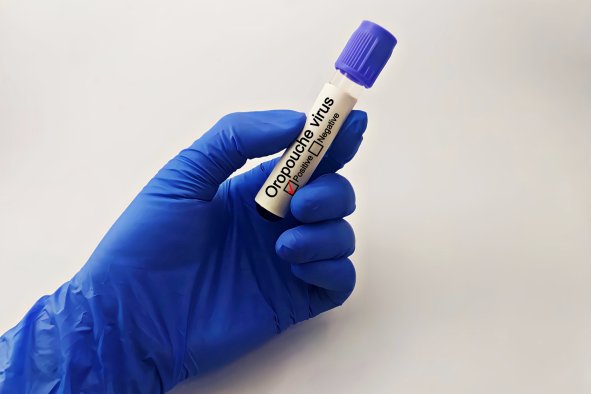Early-life exposure to common chemicals in our environment might permanently damage our gut health, research suggests, contributing to the development of diabetes and obesity later in life.
Scientists have hypothesized that exposure to these "forever chemicals" during childhood may be contributing the recent rise in these disorders among American adults.
"Persistent organic pollutants are found worldwide and they affect not only humans but also wildlife," Andrew Patterson, a professor of molecular toxicology and of biochemistry and molecular biology at Penn State, told Newsweek. "The negative health effects of these chemicals are well documented and include birth defects and cancer."
The health hazards associated with these chemicals depend on their concentrations in our surrounding environment and the age at which we are exposed. "Infants and children are considered at higher risk than adults for exposure to environmental chemicals, and they may also have been exposed in utero or through breast milk," Patterson said.
Now, research from Patterson and his team has found that these chemicals might also permanently disrupt the trillions of microorganisms that live in our guts, known as our gut microbiome.
This plays a key role in everything from our metabolism to our mental health. While these microbes can change throughout our lifetimes, the basis of our microbiome is established during the first few years of our lives. Therefore, any perturbations during this window can have long-lasting impacts on our overall physical and mental well-being.
In their study, published in the journal Environmental Health Perspectives, Patterson and colleagues focused on one "forever chemical" in particular, known as 2,3,7,8-tetrachlorodibenzofuran or TCDF. This is a byproduct of waste incineration, metal production, and fossil fuel and wood combustion. It is widespread in our environment and accumulates in the food chain, especially in high-fat foods like meat, fairy products and some fish. Babies may also be exposed through breast milk.
To explore the impacts of this chemical on the gut microbiome, the team fed four-week-old mice pills containing 0.46 micrograms of TCDF for five days. They also included a control group who were fed a placebo pill.
"In our study we used a dose that is relatively high compared to typical human exposures; however, we can use this information to identify new toxicity high points, including in the gut microbiome, and begin to extrapolate what might happen at even lower doses," the researchers wrote in a statement.
Immediately following the intervention, the researchers examined the animals' gut microbiomes, along with several other health indicators like their body weight, glucose tolerance and fat buildup in their livers. The same data was collected three months later, when the mice were effectively young adults.
"We found that early-life exposure to TCDF permanently disrupted the gut microbiomes of the wild-type mice," Yuan Tian, the study's first author and associate research professor at Penn State, said in a statement. "We also found that these mice had higher body weight and glucose intolerance at age four months."
Patterson added that certain strains of bacteria were more sensitive to the effects of TCDF than others, although more work was needed to understand why. In particular, the team noticed a marked decrease in a bacterial species called Akkermansia muciniphila, which has previously been recognized for its importance in maintaining overall gut health.
To further explore these effects, the researchers conducted a second study in a group of mice which had had their gut microbiomes removed. They gave these sterile mice microbial transplants from the group who had received the TCDF pills and found that these mice also developed metabolic disorders, indicating that this altered microbiome was indeed the cause of these diseases.
"These results suggest that early-life TCDF exposure may be causing the disturbances in gut microbiome function and health outcomes later in life, even well after the TCDF has been eliminated from the body," Tian said.
However, these disturbances might be reversible. Following the treatment, the team gave some of the TCDF-exposed mice a probiotic containing Akkermansia muciniphila and found that it restored the mice's disrupted microbiomes back to their normal state.
"It may be possible that with more research we could one day restore a person's microbiome to its optimal state through supplementation with pre- and probiotics," Patterson said.
It is also worth noting that, in real life, we are rarely exposed to a single chemical in isolation—rather, we experience a cocktail of different chemicals, usually over an extended period of time.
While more research is needed to determine whether these findings are applicable to humans, as well as how these chemicals interact with other compounds in our environment, these findings add to a growing body of evidence that these pollutants may pose a serious risk to human health.
"Government agencies here like the Environmental Protection Agency and others worldwide have been working to reduce or eliminate entirely production of persistent organic pollutants," Patterson said. "Given their persistent nature however, persistent organic pollutants produced a while ago but since banned or eliminated are still likely present in the environment."
Is there a health problem that's worrying you? Let us know via health@newsweek.com. We can ask experts for advice, and your story could be featured in Newsweek.
References
Tian, Y., Rimal, B., Bisanz, Jordan E., Gui, W., Wolfe, T. M., Koo, I., Murray, I. A., Nettleford, S. K., Yokoyama, S., Dong, F., Koshkin, S., Prabhu, K. S, Turnbaugh, P. J., Walk, S. T., Perdew, G. H., & Patterson, A. D. (2024). Effects of early-life exposures to the aryl hydrocarbon receptor ligand TCDF on gut microbiota and host metabolic homeostasis in C57BL/6J mice. Environmental Health Perspectives, 132(8). https://doi.org/10.1289/EHP13356
Disclaimer: The copyright of this article belongs to the original author. Reposting this article is solely for the purpose of information dissemination and does not constitute any investment advice. If there is any infringement, please contact us immediately. We will make corrections or deletions as necessary. Thank you.



